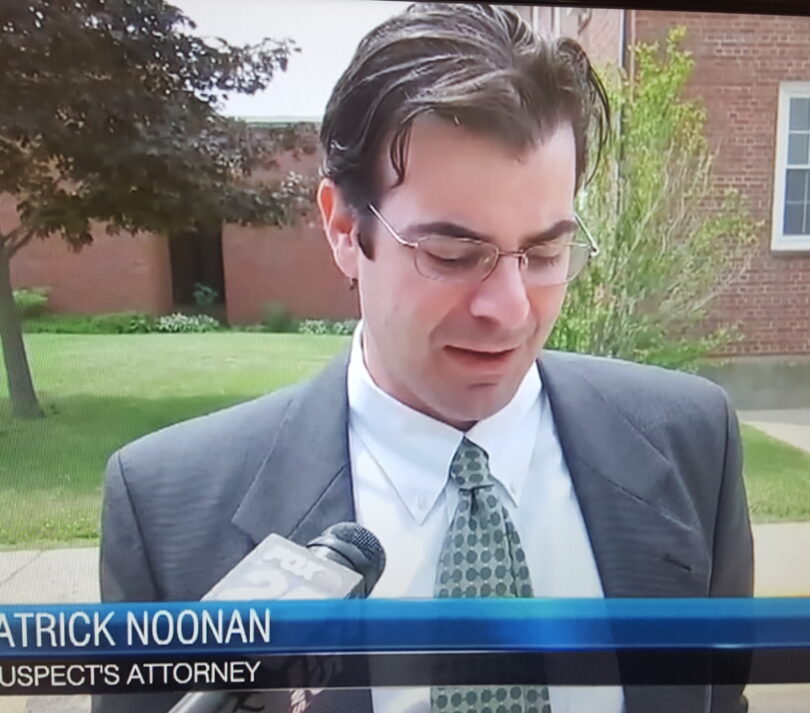Commonwealth v. G.G. – Plymouth Superior Court
THE DEFENSE TEAM OF PATRICK J. NOONAN AND BRENDAN J. NOONAN WIN NOT GUILTY VERDICTS ON CHARGES OF RAPE OF CHILD, UNNATURAL AND LASCIVIOUS ACTS WITH A CHILD, DISSEMINATION OF OBSCENE MATTER TO A MINOR, AND CHILD ENTICEMENT.
Defendant, an 81 year-old man from Hanover, was indicted by a Plymouth County Grand Jury on the following criminal offenses: (1) Rape of Child – Use of Force (G.L. c. 265, §22A), (2) Dissemination of Harmful Matter to a Minor (G.L. c. 272, §28), (3) Unnatural and Lascivious Acts with a Child under 16 (G.L. c. 272, §35A), (4) Enticement of a Child under 16 (G.L. c. 265, §26C), and (5) Enticement of a Child under 16.
The Defendant was facing a life sentence or the possibility of a very severe and long sentence. The crime of Rape of Child carries a sentence of life in state prison. The crimes of Dissemination of Harmful Matter to a Minor, Unnatural and Lascivious Acts with a Child under 16, and Enticement of a Child under 16, all carry a sentence of 5 years in state prison.
Defendant resided by himself in a home in Hanover. In May of 2016, Defendant asked his daughter and step-daughter to move into his house because he needed help around the house and help with other things. The daughters discovered stacks of handwritten notes in his house of pornographic websites, including many websites for child pornography. They searched the Defendant’s electronic devices (his iPhone, iPad, and Laptop) and discovered that his devices contained a lot of pornographic material. The daughters also noticed that a young, teenaged boy would come over to the house and do chores for the Defendant. They noticed that the Defendant would frequently provide the young teenage boy with car rides. Based on their discovery of the child pornography websites, the daughters were very concerned that the Defendant was engaging in sexual behavior with the boy. The daughters confronted the Defendant who admitted to them that he had sex with the boy on 4-5 occasions and would pay the boy for sexual favors. Defendant also stated that he and the boy almost engaged in Bestiality with a dog but the dog was too jumpy, so they couldn’t do it. The daughters decided that they needed to get the Defendant’s confession on tape, so they secretly recorded a conversation with Defendant. In this recorded conversation, the daughters spoke to the Defendant on the back porch of his home. The daughter used her cell phone, which she discretely held in her hand, to record the conversation. In the recorded conversation, the Defendant admitted to having sex with the boy on 4-5 occasions and he admitted that he would pay the boy for sexual favors. After obtaining his confession, the daughters took the Defendant’s electronic devices (his iPhone, iPad, and Laptop) from his home and brought them to the police department. At the police department, the daughters and officers searched the electronic devices. Later on, police obtained search warrants for the Defendant’s devices. A search of the Defendant’s devices revealed that word searches for “porn” returned over 7,000 hits, “erotica” returned over 8,000 hits, and “bestiality” returned over 500 hits. Police then contacted the teenage boy and had him come into the police station for an interview. Several weeks later, the boy was interviewed by the District Attorney’s Office. In his interview, the boy stated that the Defendant paid him $300 for the Defendant to perform oral sex on the boy. The boy stated that the Defendant performed oral sex on him and paid him for it. The boy stated that the incident of oral sex occurred in December of 2014 when the boy was 15 years old. The boy stated that the Defendant showed him Bestiality and he had asked the boy to provide him with child pornography. The boy stated that the Defendant would pay him money in exchange for the boy providing the Defendant with pornographic websites that were to the Defendant’s liking. In his interview, the boy mentioned that he (the boy) would bring his female friend over to the Defendant’s home and the Defendant would give them car rides. The boy was three months older than the female. The police and District Attorney’s Office interviewed the female. The female stated that she would go over the Defendant’s home during her freshman year of high school when she was around 14 years or older. The female stated that the Defendant asked her to provide him with naked pictures of herself and her friends. Defendant specifically asked her for butt, boob, and pussy pictures. The female didn’t actually provide the Defendant with naked pictures of herself or her friends. Instead, she would find naked pictures of women online. The female would tell the Defendant that the naked pictures were of herself when they were actually women online. The female stated that the Defendant would ask her and the boy to tell him sex stories of their sexual experiences. The female would make up sex stories to tell the Defendant. The female stated that the Defendant would buy them alcohol and cigarettes.
Result: Defendant was represented by Attorneys Patrick J. Noonan and Brendan J. Noonan. The Defendant was charged with three crimes (Rape of Child – Use of Force, Unnatural and Lascivious Acts with a Child under 16, and Enticement of Child under 16) – based on the same incident of oral sex with the boy. A necessary element for these offenses against the boy requires proof that the boy was under the age of 16. After an excellent cross-examination of the boy, Attorney Patrick J. Noonan was able to establish that the incident of oral sex occurred toward the end of the boy’s relationship with the Defendant, when the boy was over the age of 16. Through his cross-examination of the female victim, Attorney Noonan was able to solidify that the incident of oral sex occurred when the boy was over the age of 16. During his closing argument, Attorney Noonan showed the jurors a Chart, which outlined the timeline of events, and proved that the incident of oral sex occurred when the boy was over the age of 16. However, the jury could still find the Defendant guilty of Rape of Child – Use of Force if they found that the oral sex was done by force or without the boy’s consent. Through a very effective cross-examination of the boy, Attorney Noonan established that the oral sex was consensual. The jury found the Defendant Not Guilty of Rape of Child – Use of Force, Unnatural and Lascivious Acts with a Child under 16, and Enticement of Child under 16 because our defense team was able to prove that the oral sex was consensual and the boy was over the age of 16. Defendant was still charged with Dissemination of Harmful Matter to a Minor (the boy) and a minor is defined as a person under the age of 18. The evidence at trial showed that the boy, at all times during his relationship with the Defendant, was under the age of 18. The charge of Dissemination of Harmful Matter to the boy was based on the Commonwealth’s allegations that the Defendant showed the boy Bestiality and Child Pornography. There was no evidence at trial that the Defendant showed the boy Child Pornography. However, the boy did testify that the Defendant would ask the boy to provide him with the names of Bestiality websites. The boy would look up Bestiality websites, write down the domain names, and provide the Defendant with those domain names. Attorney Noonan asked the judge to find the Defendant not guilty on the Dissemination charge because the evidence presented by the Commonwealth was legally insufficient. Attorney Noonan argued that the Defendant did not show or disseminate Bestiality to the boy because the Defendant merely asked the boy if the boy could provide him with the names of Bestiality websites. There was no evidence of dissemination. The Judge agreed and found the Defendant not guilty of the Dissemination charge. The jury found the Defendant guilty on only one charge, which was Enticement of a Child; the child being the female victim. The Noonan’s moved for the Judge to find the Defendant not guilty of this Child Enticement offense because the Commonwealth failed to present sufficient evidence to satisfy its burden of proof. The Judge denied the request. While the jury was deliberating, the jury submitted four questions to the judge regarding the Child Enticement charge involving the female victim. The jury’s four questions were all factual questions. There were no answers for the jury’s factual questions because the Commonwealth did not present any evidence that would have answered them. In our opinion, the jury’s four factual questions suggested that the jury had reasonable doubt. Nevertheless, our law firm is appealing the Defendant’s one and only conviction for Child Enticement. This was an enormous victory because our client was facing a life sentence. Due to our client’s advanced age, any jail time would be a life sentence.
Click here to read Enterprise Newspaper Article: “Hanover man, 81, acquitted of most charges in child enticement case.”



